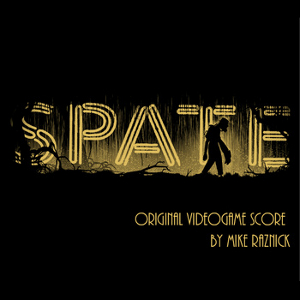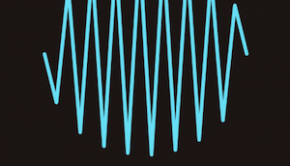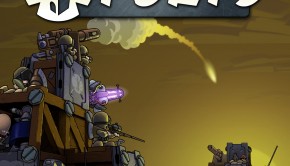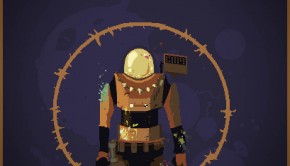SPATE Original Videogame Score
 |
Album Title: SPATE Original Videogame Score |
| Record Label: Bandcamp |
|
| Catalog No.: N/A |
|
| Release Date: March 27, 2014 |
|
| Purchase: Download at Bandcamp |
Overview
SPATE is a new indie title developed by Eric Provan, available on Linux, Mac, and PC, either as a download from the site or from the STEAM store. While technically a platformer, don’t let the genre deceive you; this isn’t your Mario or Sonic kind of platform game. The story begins after the death of the main character’s daughter and subsequent departure of his wife . The protagonist, a detective, sets out two years later to discover the mysteries of a nearby island, but has become addicted to alcohol, namely absinthe, since his tragedies, which actually becomes a part of the gameplay. For every drink the detective takes (which can be initiated by the player), he becomes more athletic and a more capable platform character. However, the world around him subsequently becomes more distorted and unrecognizable. The platform levels teeter between unsettlingly beautiful and downright creepy; any aesthetic value the player might find in the world is matched by a strong sense of discomfort, as if there is something inherently wrong with it. Provan doubles as the artist of the game, emerging from studios like Jim Henson and Disney, creating a dark, steampunk world grotesquely out of balance. The music of SPATE is scored by Mike Raznick, an extremely versatile composer with an enormous range of experience in the music departments of several different projects, from Ratchet & Clank to FarmVille to The Discovery Channel’s Life.
Body
SPATE‘s score has a strong emphasis on strings, with several of the pieces using string ensembles almost exclusively. The quality of the orchestration and live performance is very evident throughout. The opening track, “Prologue”, begins with a solo cello playing an ominous solo, and the roughness of the bow across the string comes across very clearly. The solo is almost completely played on the open lowest string, and sounds so guttural at times that those not listening carefully enough might confuse it with a string bass. It is unusual for string players to play on open strings, let alone their lowest; particularly when an entire string orchestra is available, composers will generally switched to the next lowest instrument if they find themselves on the lowest possible note of an instrument, for better tuning. As it is, the opening note of the opening song being the lowest possible note of the second-lowest instrument seems to make a statement about the game. This game is not going to be completely sensical, it’s not going to follow normal conventions, and it will be unsettling. The cello’s solo melody is not a happy one; it’s not even melancholy — a mournful piece to draw the player in to unite with the protagonist’s sadness. It’s simply dark: it repels the player, raising the edginess that the player might feel when beginning the game for the first time.
While the overall tone of the soundtrack is a constant one set by “Prologue”, the various tracks have subtle differences in mood. “Venetian Dream” walks the line between sorrowful and creepy; Raznick incorporates a descending motif from the highest to the lowest strings; the melodic lines are rippling, elegant, and would be downright beautiful if not for the accompanying harmonies on strings that play almost strictly chromatic notes, adding another layer of tonality to the piece. Yes, it’s a sad piece, but, like the world of SPATE, there is something not quite right about the way it plays out. It sounds #&151; for lack of a better word — off. “Dangerous” has a similar feel; it opens with a distinct melodic lines and refreshingly normal chord progressions, but the instruments have an almost rusty quality to them that make them feel old and worn out, and by the end of the piece, the melody from “Prologue” has resurfaced, and the strings seem to collapse out of exhaustion from the steadiness and sanity they had maintained up to this point.
The strings are occasionally accented by other instruments. Most notably, a soprano solo line lightly brushes against a few of the tracks, including “Venetian Dream”, although only to a very small degree in that piece. “The Swamp” is mostly atmospheric, with length dissonant chords, and sharp, jarring staccato notes, including from a surprisingly sudden piano about halfway through the piece. The soprano line enters and leaves at a few different points, sometimes to deliver an ethereal melody line, and sometimes to add or reinforce a note in a chord. “Ascension pt. 2” actually opens with the vocal line, although this time, it is more of an alto voice, and quickly blends into a swell of instruments — brass, woodwind, and string — although as the piece continues, the voice remains more prominent than previously on the soundtrack. The strings rise climactically to the highest notes of the violin, and the vocal line swells up with her accompanying instruments, quickly entering soprano range. As the piece pauses in the middle, as if taking a breath before the finale, we hear some rare percussion and a pulsing string rhythm momentarily before it fades and the voice returns, rising again but this time above the strings. There is no end destination to most of the pieces on this score; like the detective, they wander and explore, sometimes pushing the limits of their ranges, sometimes descending or falling from weariness.
Many of the tracks work wonderfully in the context of SPATE, but don’t make for comfortable listening outside of the game — Raznick’s score is unsettling, simultaneously restless and worn, and refusing to follow the common conventions of musical composition. One track that makes for more accessible listening and demonstrates the composer’s ability both in and outside of SPATE is the penultimate track, “A Choice”, which brings back a similar descending pattern to Venetian Dream, but expands on the harmonies, elegantly coaxing the simple lines of music into a more complex tapestry of undistinguishable melodic harmonic lines. This is the mournful piece that ties the soundtrack together; it acknowledges the distortion of the world from a more distant perspective, refusing to fall into the detective’s twisted mind. This is the empathetic piece that during which the listener can step back and see the life and journey of the detective and finally feel sad without the overhanging fear so prominent in the rest of the game. The instrumentation in this piece is a simple string quartet, and while it does follow many of the patterns of the rest of the soundtrack, like the descending pattern, each trope plays into the musicality of this piece. The descending pattern is balanced by a simultaneous ascending pattern; when the piece rises and swells, it actually resolves on a major chord after a brief pause instead of wearily giving up and falling back down. The multiple countermelodies give the piece both life and uncertainty, the various musical patterns lull the listener into a state of something like peace; this piece is sorrowful and sweet, and would conclude the soundtrack on a tender note.
Instead, the soundtrack closes with “A Splash of Absinthe”, a far more appropriate-to-the-game conclusion with soft, eerie chorals, dissonant brass, and that solo cello that has stuck with us throughout the soundtrack. Just as “A Choice” tied together everything that could be beautiful about this soundtrack, “A Splash of Absinthe” brings together every area of discomfort from the music we have heard up to this point and throws it into a single dark and ominous track, from high melodies matched with dissonance to instruments playing in abnormally low ranges. A jarringly high violin plays a melodramatically plaintive melody while the lower strings pulse with something not quite in the same key, and the violin ultimately fades off, replaced by a brief alto string as the rest of the string orchestra fades away without resolving.
Summary
Raznick certainly adds to the game with his compositional talent and careful instrumentation to match the drunken, unstable world of SPATE. While this soundtrack may not qualify as fun listening outside of the game (and rightly so), it works very well with the nature of the game. It is worth looking up if you appreciated it within the game or are looking for an unusual artistic stand-alone experience. This is one of those cases where the game — and therefore the soundtrack — is not necessarily meant to be enjoyed, at least in the traditional sense, but instead, experienced. The soundtrack is certainly an experience. If you think you’re unlikely to find the whole score appealing, I would recommend checking out “A Choice” at the very least — as a musical traditionalist to a fault, I have found this piece to be a wonderful gem in the dark score of SPATE. Overall, Raznick has given us an strange and thoughtful score to accompany a strange and thoughtful game.
Do you agree with the review and score? Let us know in the comments below!
4
Posted on July 13, 2014 by Emily McMillan. Last modified on July 13, 2014.














